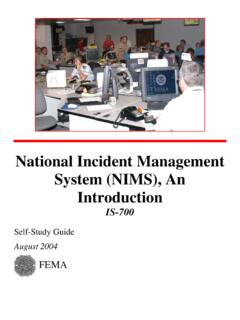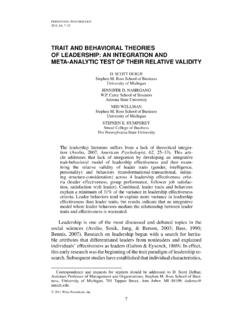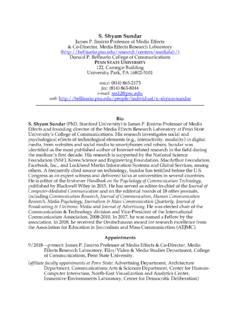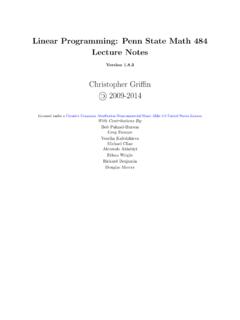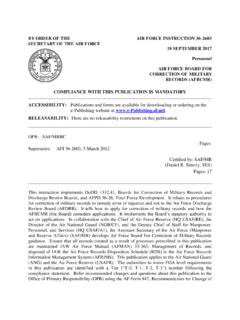Transcription of The Labyrinth of Solitude - Pennsylvania State University
1 The Labyrinth of Solitude The Other Mexico Return to the Labyrinth of Solitude Mexico and the United States The Philanthropic Ogre BY OCTAVIO PAZ. TRANSLATED FROM THE SPANISH BY. Lysander Kemp, Yara Milos, and Rachel Phillips Belash Grove Press, York Copyright 1985 by Grove Press, Inc. All Rights Reserved. The Labyrinth of Solitude 1961 by Grove Press, Inc. The Other ~exico 1972 by Grove Press, Inc. "Return of the Labyrinth of Solitude ," "~exico and the United States," and "The Philanthropic Ogre" 1985 by Grove Press, Inc. 1--- Grateful acknowledgement is made to Dissent for the first appearance of "The Philanthropic Ogre" and to The New Yorker for the first appearance of The other does not exist: this is rational faith, the incur- "Mexico and the United States," which was originally titled "Reflections- Mexico and the United States.
2 ". able belief of human reason. Identity = reality, as if, in the end, everything must necessarily and absolutely be No part of this book may be reproduced, stored in a retrieval system, or transmitted in any form, by any means, including mechanicaL electronic, one and the same. But the other refuses to disappear; it photocopying, recording or otherwise, without prior written permission of subsists, it persists; it is the hard bone on which reason the publisher. breaks its teeth. Abel Martin, with a poetic faith as First Grove Press Edition 1985. First Printing 1985 human as rational faith, believed in the other, in "the ISBN: 0-394-52830-1. essential Heterogeneity of being," in what might be Library of Congress Catalog Card Number: 82-47999. called the incurable otherness from which oneness must First Evergreen Edition 1985.
3 First Printing 1985. always suffer. ISBN: 0-394-17992-7 -Antonio Machado Library of Congress Catalog Card Number: 82-47999. Library of Congress Cataloging in publication Data Paz, Octavio, 1914- The Labyrinth of Solitude , the other ~exico, and other essays. I. National characteristics, ~exican-Addresses, essays. lectures. 2. ~exico-Civilization-Addresses, essays, le~tures. I. Title. 1985 306' ,0896872 82-47999. ISBN 9-394-52830-1. ISBN 0-394-17992-7 (pbk.). Printed in the United States of America GROVE PRESS, INC., 196 West Houston Street. New York. N.. 10014. 1 354 2. CHAPTER TWO. Mexican Masks Impassioned heart, disguise your sorrow .. -Popular song The Mexican, whether young or old, criollo or mestizo,l gen- eral or laborer or lawyer, seems to me to be a person who shuts himself away to protect himself: his face is a mask and so is his smile.
4 In his harsh Solitude , which is both barbed and courteous, everything serves him as a defense: silence and words, polite- ness and disdain, irony and resignation. He is jealous of his own privacy and that of others, and he is afraid even to glance at his neighbor, because a mere glance can trigger the rage of these electrically charged spirits. He passes through life like a man who has been flayed; everything can hurt him, including words and the very suspicion of words> His language is full of reticences, of metaphors and allusions, of unfinished phrases, while his silence is full of tints, folds, thunderheads, sudden rainbows, indecipherable threats. Even in a quarrel he prefers veiled expressions to outright insults: "A word to the wise is sufficient." He builds a wall of indifference and remoteness between reality and himself, a wall that is no less impenetrable for being invisible.
5 The Mexican is always remote, from the world and from other people. And also from himself. The speech of our people reflects the extent to which we protect ourselves from the outside world: the ideal of manliness 'Criol/o: a person of pure Spanish blood living in the Americas. - Tr. Mestizo: a person of mixed Spanish and Indian blood. - Tr. 29. 30 / The Labyrinth of Solitude The Labyrinth of Solitude / 31. is never to "crack," never to back down. Those who "OPJ~ILth~J:11- Narcissus, in the pool that reflects us; we try to stop it up selves up" are cowards. Unlike other people, we believe that instead. Our anger is prompted not only by the fear of being opening oneself up is a weakness or a betrayal. The Mexican can bend, can bow humbly, can even stoop, but hp cannot back used by the also by ourshame confidants - thatrenounced of having fear is common to everyoneconfide our Solitude :To - but down, that is, he cannot allow the outside world to penetrate in others is to dispossess oneself; when we have confided in his privacy.
6 The man who backs down is not to be trusted, is a someone who is not worthy of it, we say, "I sold myself to traitor or a person of doubtful loyalty; he babbles secrets and So-and-so." That is, we have "cracked," have let someone into is incapable of confronting a dangerous situation. Women are our fortress. distance between one man and another, which inferior beings because, in submitting, they open -themselves creates mutual respect and mutual security, has disappeared. up. Their inferiority is constitutional and resides in their sex, We are at the mercy of the intruder. What is worse, we have their submissiveness, which is a wound that never heals. actually abdicated. Hermeticism is one of the several recourses of our suspicion All these expressions reveal that the Mexican views life as and distrust.
7 It shows that we instinctively regard the world combat. This attitude does not make him any different from around us to be dangerous. This reaction is justifiable if one anyone else in the modern world. For other people, however, considers what our history has been and the kind of society we the-manly ideal consists in an open and aggressive fondness for have created. The harshness and hostility of our environment, combat, whereas we emphasize defensiveness, the readiness to and the hidden, indefinable threat that is always afloat in the repel any attack. The Mexican T/};J1 the male - is a hermetic air, oblige us to close ourselves in, like those plants that survive being, closed up in himself, c~pable of guarding both himself by storing up liquid within their spiny exteriors. But this atti- and whatever has been confided to him.
8 Manliness is judged tude, legitimate enough in its origins, has become a mechanism according to one's invulnerability to enemy arms or the impacts that functions automatically. Our response to sympathy and of the outside world. Stoicism is the most exalted of our military tenderness is reserve, since we cannot tell whether those feelings and political attributes. Our history is full of expressions and are genuine or simulated. In addition, our masculine integrity incidents that demonstrate the indifference of our heroes toward is as much endangered by kindness as it is by hostility. Any suffering or danger. We are taught from childhood to accept opening in our defenses is a lessening of our manliness. defeat with dignity, a conception that is certainly not ignoble. Our relationships with other men are always tinged with And if we are not all good stoics like Juarez and Cuauhb~moc, suspicion.
9 Every time a Mexican confides in a friend or acquaint- at least we can be resigned and patient and long-suffering. ance, every time he opens himself up, it is an abdication. He Resignation is one of our most popular virtues. We admire dreads that the person in whom he has confided will scorn him. fortitude in the face of adversity more than the most brilliant Therefore confidences result in dishonor, and they are as dan- triumph. gerous for the person to whom they are made as they are for This predominance of the closed over the open manifests the person who makes them. We do not drown ourselves, like itself not only as impassivity and distrust, irony and suspicion, 32 / The Labyrinth of Solitude The Labyrinth of Solitude / 33. but also as Form surrounds and sets bounds to the dictatorship of Porfirio Diaz and the Revolution of 1910.
10 In our privacy, limiting its excesses, curbing its explosions, isolat- a certain sense the history of Mexico, like that of every Mexican, ing and preserving it. Both our Spanish and Indian. heritages / is a struggle between the forms and formulas that have been have influenced our fondness for ceremony, formulas, and order. imposed on us and the explosions with which our individuality A superficial examination of our history might suggest other- avenges itself. Form has rarely been an original creation, an wise, but actually the Mexican aspires to create an orderly world equilibrium arrived at through our instincts and desires rather regulated by clearly stated principles. The turbulence and ran- than at their expense. On the contrary, our moral and juridical cor of our political struggles prove that juridical ideas play an ~ormsoften conflict with our nature, preventing us from express- important role in our public life.
